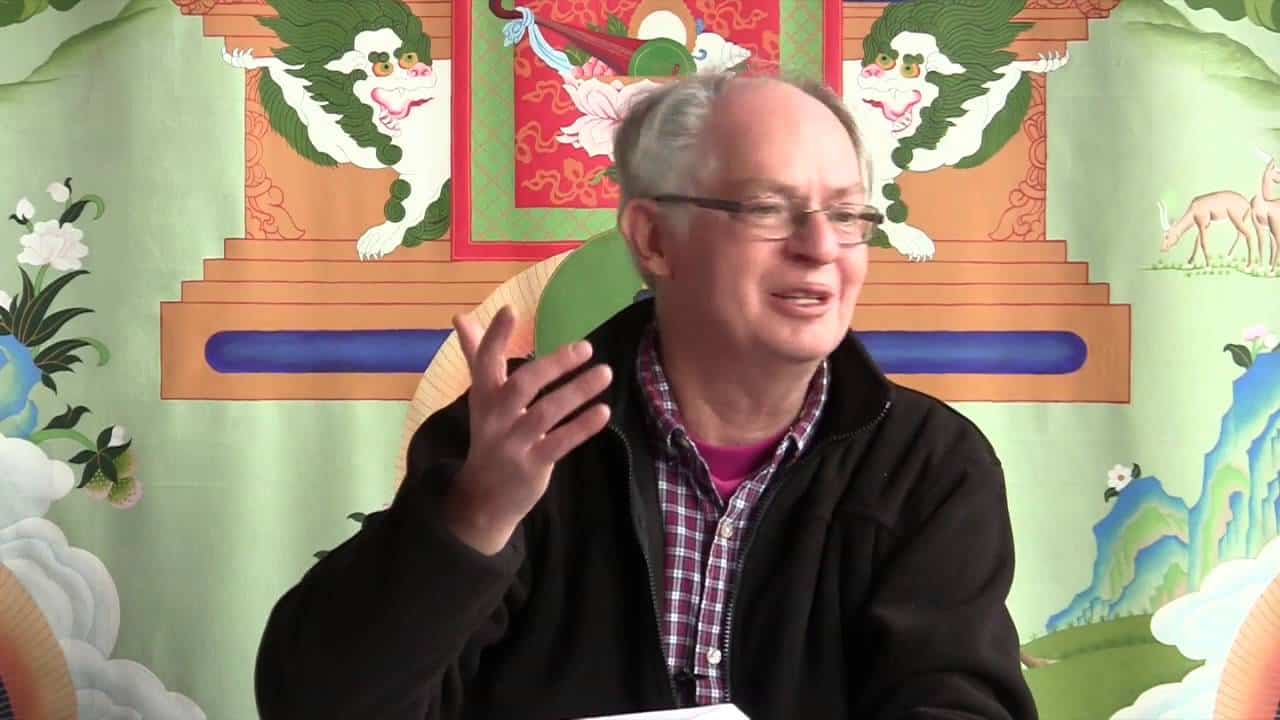Antidotes to arrogance
Part of a series of teachings on a set of verses from the text Wisdom of the Kadam Masters.
- Thinking about what we don’t know
- Thinking about how all our talents and abilities come from others
- Taming the self-centered attitude
- The defects of self-centeredness
Wisdom of the Kadam Masters: Antidotes to arrogance (download)
We’re still on line 2:
The best discipline is taming your mindstream.
We’ve talked about the antidotes to several of the afflictions. I just wanted to mention, because we didn’t talk about arrogance, that the antidote for that is…. Well, one antidote is, they say, thinking about the 12 sources and the 18 constituents, because, well first of all it’s very difficult so it humbles you, but also because it makes us understand that we’re just a compilation of different factors so there’s no person there to be proud of, to think is so great to start with.
I also find remembering that everything I know and any talents and abilities I may have all came due to the kindness of other people who either taught them to me or encouraged me. It’s not like we came out of the womb with all of our knowledge or all of our fantastic qualities that somehow the world doesn’t appreciate enough, but these all come due to the kindness of others, so to really keep that in mind.
I wanted to talk some more about, when it’s talking about taming the mindstream, one of the principal things to tame is the self-centered attitude. That’s the mind that thinks, “I’m the center of the universe, my happiness and suffering is more important than others’, my ideas are the best ones, whatever I want should come about that way.” The self-centered attitude differs from the self-grasping ignorance. Self-grasping ignorance projects a false mode of existence onto the self, thinking that it’s inherently existent. That self-grasping ignorance is an afflictive obscuration that prevents us from attaining liberation.
The self-centered attitude and the self-grasping ignorance are very good friends, however. They help each other a lot in us ordinary beings, because we grasp at ourselves as being some inherently existent person, and then from there we take off into attachment and anger, and of course, “What I want is more important, what I don’t like, I should have my way,” etc.. So they really collaborate on creating a mess.
However, we can eliminate the gross levels of self-centeredness, and the subtle levels of self-centeredness block us from becoming buddhas, because they block us from entering the bodhisattva path, because the subtle level of self-centeredness is, “I’m just looking out for my own liberation.” You can be free of the self-grasping but still have that subtle self-centeredness.
They say the self-centered thought is not an afflictive obscuration, it’s not a cognitive obscuration, but it’s an obscuration to the Mahayana path. So since we all want to enter the Mahayana path, and that self-centered thought is what prevents us from generating bodhicitta, then clearly we want to oppose it.
One of the best ways to oppose it is to remember its defects. Many of its defects overlap with the defects of self-grasping ignorance, but that doesn’t matter. In texts such as “The Wheel of Sharp Weapons” (which a commentary will be coming out on August 9th, hopefully, and hopefully all the corrections will go in tomorrow, I’m still waiting on somebody) it talks a lot about the defects of self-centeredness, and we can see them so clearly in our lives. You can start out looking at the defects, how they influence you in this life, and then progress from there, how they create problems to have a peaceful death, a good rebirth, how they make it difficult to enter the bodhisattva path, to attain full awakening.
What’s very important when you do this whole meditation about the defects of self-centeredness is that we’re very clear from the outset that our self-centeredness and the conventional “I” are two different things. If you don’t differentiate this, when you do the meditation you come out with the wrong conclusion and you hate yourself and criticize yourself, which was certainly not the purpose of the Buddha teaching this meditation because we already know how to hate ourselves and criticize ourselves. We don’t need further instruction on that.
We have to be very clear. The conventional “I” just exists by being merely labeled in dependence on the aggregates. That’s it. The self-centeredness is some extra added garbage that’s clinging to the mere “I”, making a big deal about it. But we are not our self-centeredness. Our self-centeredness is not us. We are not inherently selfish. We have a long and familiar pattern and association with selfishness, but it is not in the nature of our mind, so it not who we are and we have to be very, very clear about this.
The reason I say that we have to be clear about it is because there is the potential for misunderstanding. I remember some years ago talking to a friend of mine at a Dharma center…. The Tibetans don’t have this problem with low self-esteem and self-hatred that we do in the West. At least, they don’t have as much of a problem as we do, so the Tibetan lamas don’t understand this kind of thing inside of the mentality. So she was equating the “I” with the self-centered attitude, and seeing all the fault of the self-centeredness, and then just saying, “Something’s wrong with me. I’m so bad because I’m so selfish, I only think of myself, something’s really wrong with me, I’m a horrible person.” And she told this to one lama, and maybe it was the translation or whatever it was, and she said, “Is this how I’m supposed to be thinking?” And he said, “Yes.” Because he didn’t understand that this thing of, “I’m such a bad person because I’m so selfish,” was this whole thing of guilt and self-blame, and all, and he was just thinking it’s purely simple, see the disadvantages of selfishness. I remember she and I were talking and I said, “No, that’s not right,” and we had a long talk about it, and she was so relieved afterwards, because by having that kind of thought she kept herself trapped for quite a long time in just feeling lousy about herself. And when you feel lousy about yourself your energy goes into that, it doesn’t go into changing.
That’s why I said we have to be very clear, and if you start going into, “I’m such a bad person, I’m such a guilty person,” stop and realize that low self-esteem and guilt and self-shame are all products of the self-centered attitude. Those are not only the wrong conclusions to come to, but they’re giving the self-centered attitude a boost and making it more powerful. Why? Because when there’s low self-esteem, self-hatred, guilt, what’s it all about? “Me! I am so special. I’m the worst one in the world. I have enormous power because I can make everything go wrong. That’s how powerful I am.” Really, isn’t it? There are situations that happen and things that happen in relationships, and we say, “It’s all my fault, I’m so selfish.” That’s giving ourselves a lot more power, as if there’s only one cause when there are relationship problems. Are any situations that simple? They’re not. Relationship things are very complex. So let’s not go to this simple thing of, “I’m so bad, nobody loves me.” It’s just more of the self-centered rubbish.
On the other hand we need to really look at the self-centered thought clearly and see what its shenanigans are.
We’ll stop here for now and talk about its shenanigans on Wednesday, but between now and Wednesday try and be aware, because I’m sure you’ve had teachings on this before. Be aware of how the self-centered attitude acts in you, what it causes you to do, say, and think, and feel.
Venerable Thubten Chodron
Venerable Chodron emphasizes the practical application of Buddha’s teachings in our daily lives and is especially skilled at explaining them in ways easily understood and practiced by Westerners. She is well known for her warm, humorous, and lucid teachings. She was ordained as a Buddhist nun in 1977 by Kyabje Ling Rinpoche in Dharamsala, India, and in 1986 she received bhikshuni (full) ordination in Taiwan. Read her full bio.


